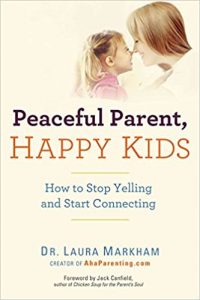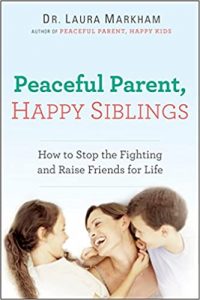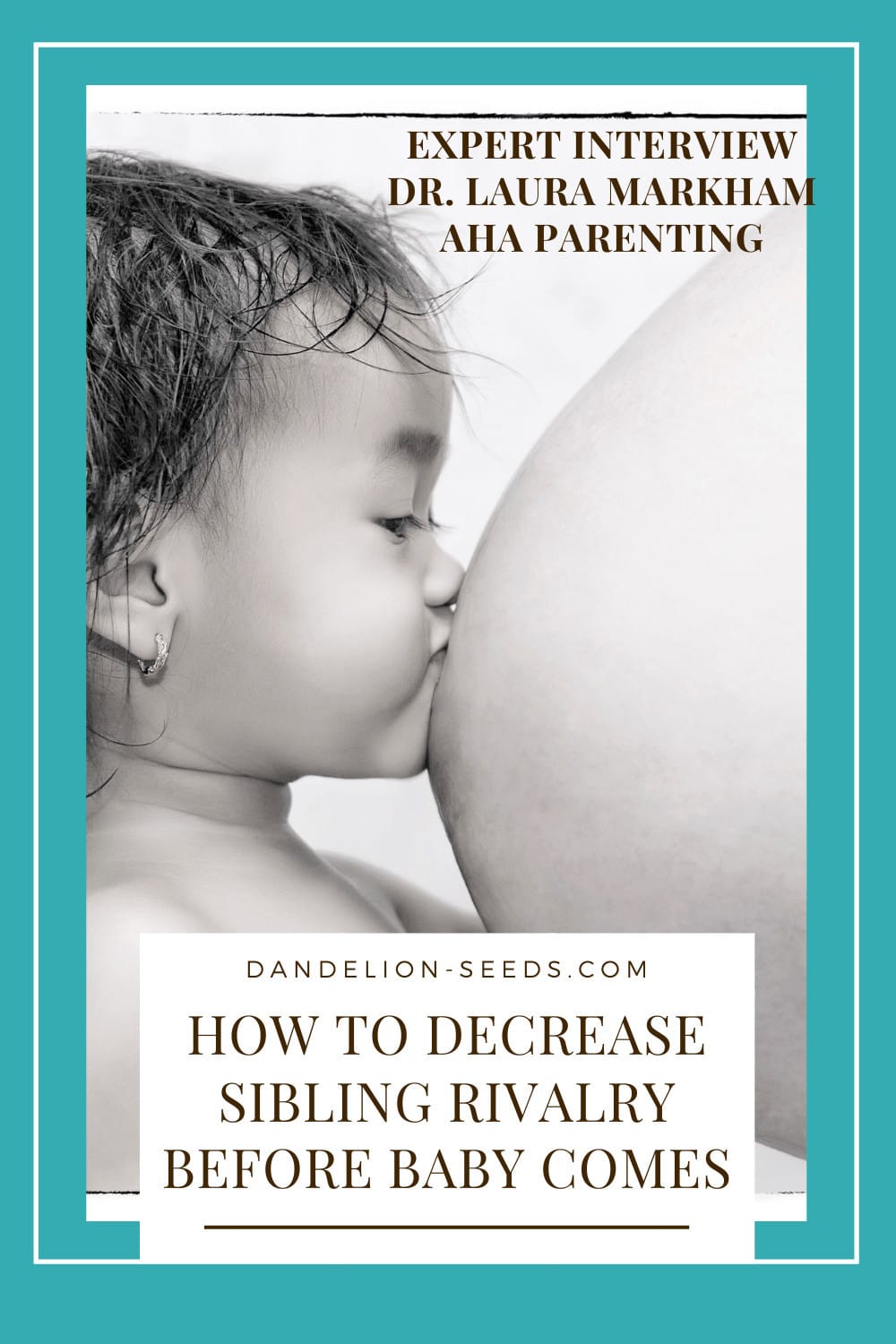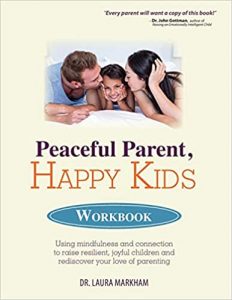
Sign in
Don't have an account with us? Sign up using the form below and get some free bonuses!

In this interview excerpt, Sarah at Dandelion Seeds Positive Parenting discusses with Dr. Laura Markham of Aha! Parenting how to create a strong sibling bond -- even before the new baby arrives, and in the early days after introducing baby at home.
If you'd like to see the full interview, which covers the lifespan of nurturing the sibling bond through childhood, you can view it here.
Hello!
I'm Sarah from Dandelion Seeds Positive Parenting,

and today I have the incredible privilege of speaking with Dr. Laura Markham of Aha! Parenting about the sibling bond. She is the best-selling author of three books, including "Peaceful Parent, Happy Kids" and its associated workbook, and our topic for today, "Peaceful Parent, Happy Siblings," which I absolutely love when it comes to the relationship that we're trying to foster among the children in our homes.
Dr. Laura, thank you so much for being here and for sharing your wisdom about the sibling bond with us.
My pleasure.
Let's start talking about the sibling bond. Before we ever have a single child in our arms, we envision the kind of relationship we want our kids to have together someday. However, if you'll humor me for just a second, when I say "sibling," what's the word that comes up for you?
[Laughter] Yes. Rivalry. Immediately, we fill in that blank.

Exactly. So, we know what we want -- we know the kind of relationships we crave for our children, and yet our default is to also realize there's some inherent tricky stuff in raising one child, much less multiple children in the same home.
For starters, let's say we've been blessed, either through birth or adoption, of caring for one child. And now, our family is growing again. Before that second child even enters our home, what can we as parents do to set the stage for a positive sibling bond between our children?
So one thing is to not just jump into shocking your child by saying, "Oh, we're having a baby." I mean, first of all, the language would be not, "We're having a baby," but "You're going to be a big sister." "You're going to be a big brother." That's the language.
But even before you get there, back up.
If you know that you're moving in that direction, I would, a month or two before you're going to tell your child, start reading books to your child. You're reading all the time to your child, right?
...Find the books that look good to you. Some books about siblings make it look pretty miserable, because they want to empathize with the older child, right? They say, "Oh, babies are so smelly and awful."
We don't want that kind of a book.
We want a book where even though sometimes the child wonders if it's really okay to have the baby around, the parents really come through for that child. It looks like a great experience, and that baby turns out look up to the older child.
So, read some good books with your little one about being a big sister or brother. Say to them, "Have you noticed that your friend Jason has a little sister / your friend Chrissy has a little brother? Do you think you might like to have a little brother or sister someday?"

Whatever your child says is okay. If your child says "No, I'm the baby," which is what my daughter said to me, then that's great.
Now you have something to work with. It's good you did that before you said, "Oh, guess what? [You're going to be a big brother.]" Right? When they say "no," you say, "Wow, you really don't want to have it be a big brother or sister. Why not?"
And she says, "I'm the baby."
You can say, "You will always be my baby no matter what. Even if you're a big sister and there's a little boy or a little girl that comes along...you will always be my Alice. I could never love anyone more than I love you." - Dr. Laura on the sibling bond; how to respond if your child resists a new sibling because they want to be the only "baby" in your home
So this is an opportunity before it becomes a fraught thing, where she feels like she can't tell you. She can actually express the negativity. But more often, kids don't express it that directly.
I mean, that's a four-year-old talking, right? More often, they will express it as, "Jason's little sisters always knocking down his towers," or "Chrissy's little brother cries all the time," right?
That's also important, and you can address that. You could say, "Yeah, babies do cry a lot. And you know what? You cried a lot when you were little, but guess what?" You you got a little older and you didn't cry as much, and then we started having so much fun. And if you had a brother or sister, they might cry, but we could take care of them and make them feel better, and then  they would get old enough to stop crying and we would have so much fun with them."
they would get old enough to stop crying and we would have so much fun with them."
So there's a way to talk to them about their objections.
It's sort of like if you've ever been in sales, you can't make the sale until you surfaced the objections and helped the customer realize, "Those things don't have to define the transaction. Maybe there's something positive here."
You're doing that with your child. You're starting the conversation even before you tell them they're going to be a big sister or brother. And then when you do tell them again, you're doing it from their perspective.
You're not saying, "Mommy's pregnant. We're going to have a baby." You were saying, "You're going to be a big brother or sister."
And they're like, "Well, what does that mean?" Then you say, "Well, there's a baby growing inside Mommy right now." Or if you're adopting, you say when the baby's going to be coming to live with you. You give them a sense of timing.
You tell them, "You know, it takes a long time for a baby to grow, but when it gets cold, when the leaves start to fall from the trees, that's when the baby will come." Keep it really simple.
If your child expresses any worries, you say "It sounds like maybe you're a little worried about being a big brother."
Sometimes kids worry that that Mommy and Daddy will pay a lot of attention to the baby and not to them, but give them the reassurance of, "There is a Michael-sized place in my heart that is just for you, that no one else could ever fill. I could never love anyone more than I love you."
Your kid gets that "Okay, I've got a protected place here."
Now, that doesn't mean they won't have doubts as time goes by, and that will they will surface. But at least right from the beginning, they're starting to get a sense that you're listening. And they're allowed to talk to you about anything that bothers them. - Dr. Laura Markham on the sibling bond and allowing your children to express themselves fully
If they express any worries or doubts, you say, "Thank you for telling me that. If you ever feel worried about the baby, you can always tell me. I will always want to hear, and I will always understand, and I will always try to help."
I love that so much.
You've touched on one of my love languages, which is books. Books are fabulous tools for a little ones to understand things without having to live them firsthand. And everything else you shared is empathy-based, it's connection-based, it's active listening. It's validating the child's experience rather than imposing our adult perspective upon them.
And I love the space you have created for the child's feelings to process in natural and healthy ways.
Now, let's move on. Baby's here. It's time for introductions and those first days at home.
What can we do now to nurture the sibling bond?
Reality has hit. There's an actual new little body in the house. How can we help our little ones adjust once they realize this isn't just a story we read in the book? This is really happening.
[Kids' first reaction] is often panic. They often go through a moment of panic where they realize the baby's not going away.
So important -- even before the baby actually arrives -- that you've done something to help the sibling bond. That may sound crazy. The baby was in utero.
...There's some research that shows that the way the older child begins to think about the baby is influenced by the way we talk to them about the baby. And the way they think about the baby influences how they feel.
You can start [nurturing the sibling bond] when the baby's in utero, but you continue when the baby is at your house. To begin with, you say things like, "Hmm. I wonder what he's doing in there. Feel this. Is he kicking? You think he's doing karate?" Or, "Let's sing to him and see whether he likes it or not. Do you think we can tell?"
You're acting as if this unseen lump in your belly that's, you know, something's jutting out "Is that really a foot?" You're acting as if it's a real person and it might have feelings.
And then when the baby does arrive, and you're saying, "Oh, I wonder why he's crying. What do you think he needs?" Your child is beginning to develop empathy for the baby in that moment.
The research on this shows that a year later, when the researchers came back, they had some parents who they taught to make comments like this. They [also] had a control group who didn't make those comments. Lo and behold, the parents who made those kinds of comments, the older child felt more positively toward the baby, who is now one year old. And the one year old was much more bonded to the older child because the older child set the tone of the relationship.
We could talk more about it, but that's an example where you could start [nurturing the sibling bond] even before the baby comes home.
Another example is when the baby's still inside you.
Anything you feel that releases neurotransmitters into your bloodstream, your baby is feeling. - Dr. Laura Markham on the importance of our feelings that influence the sibling bond
So when you feel the warm fuzzy of appreciation toward your child, the baby's getting that, too. You can have your child sing to the baby or talk to the baby [to foster the sibling bond]. And as that's happening, you really savor it, really take it in. What you're doing is flooding the baby with neurotransmitters that feel good while they listen to the child's voice.
When the baby's born, the baby is born knowing the voices: your voice, your partner's voice, the other older child's voice. They have a great feeling about the older child. You can even have that go both ways by talking to your older child about how the baby feels when they sing, right?
So, your child gets to sort of participate in those good feelings through what you're describing of how the baby's responding to them. That's another example of the pre-birth sibling bond.

Now we have a new baby.
Let's say you didn't give birth at home. You gave birth at a hospital. You're coming home. You've got the baby in your arms. You're getting out of a car. You've got the baby. Your child is there with Grandma at the door of the house. You don't get the newborn out of the car seat.
All children have an attachment hierarchy. It's completely natural. We're programmed this way. The person who is the most responsive in terms of protection, and also children define that as warmth. "What makes me feel protected and cared for," right? "Who's warm toward me? Who responds when I fall down and skin my knee?"
So that's always the first person in the hierarchy. It's usually the parent who spends the most time with the child, although not always. And then there's the next parent, usually, and then there might be grandma or a nanny or a preschool teacher or whoever.
The first person in that hierarchy enters the house with arms open to their child. They're not holding a baby.
The baby's being held by the partner or someone else. So, you know your newborn can do without you holding them for that moment.
Somebody else can get them out of the car seat and bring them in the house. You've just been separated from your child, probably overnight.
Your job is to hold your arms wide open, because for your child, the big event is not that baby. The big event is that they were separated from you, right? That's what we don't want them to associate the baby with: more separation. - Dr. Laura Markham on how to nurture the sibling bond once baby comes home
We want you to be, "Oh, my darling. I missed you. I'm so glad to see you." Spin them around get them laughing. Laughter reduces the stress hormones in the child's body, which are there because of the separation.
And because of their anxiety about the whole thing with the baby, so you're getting them laughing. Also, laughter increases oxytocin, which is released into the system. Oxytocin is a bonding hormone. Now, not only is your child bonding with you, they're also about to bond with the baby.
You say, "I've got somebody for you to meet. Come on!" And you you install yourself on the couch with your child. You say, "Daddy's bringing in the baby. Want to meet the baby? What are we going to say to the baby?"
You're now aligned with your child, not with the baby.
The other partner brings in the baby.
You're sitting there on the couch and your partner puts the baby on the couch. You're together; it's totally safe. Your three-year-old is not going to drop the baby because you're there to put the baby in your three-year-old's arms.
Now we use biology again. You say, "Doesn't the baby smell good? Smell the top of her head. Yeah." Now this is pheromones at work -- pheromones that the baby gives off. This is one of the reasons that we don't hurt our babies, even when they wake us up in the middle of the night and we're just beside ourselves with lack of sleep. It's because we smell those pheromones and it just makes us want to protect the baby. - Dr. Laura Markham on using biology to nurture the sibling bond
So your child is now inhaling those pheromones from their little sibling. They feel protective. They're going to get pretty annoyed at the sibling more than once in the next week -- forget the next 10 years.
And so, as they're inhaling these pheromones, they're starting to feel protective. That's the first thing that happens -- even before any jealousy or irritation.
That there's a lot of research about this and a lot of science we can use that we can support our children [in the sibling bond].
I love that -- brain science, biological science, it all makes so much sense for the sibling bond.
When we can point to these studies that prove even the things we can't see are still making a difference in the connections that our children are forming together.
We can use that science to our advantage when we decide what kind of parents do we want to be. This isn't just a relationship between our children. This is a family dynamic. And we foster the type of relationship within our homes that is peaceful; that is conducive to positive relationships for all of us -- not just the sibling bond among our children.
Stay tuned for the next section of the interview, where Dr. Laura Markham talks about nurturing the sibling bond as the siblings get older.
In the meantime, make sure to check out our short but information-packed parenting courses.
Dr. Laura Markham is the founder of AhaParenting.com and author of Peaceful Parent, Happy Kids, Peaceful Parent, Happy Siblings and her latest book, the Peaceful Parent, Happy Kids Workbook.
